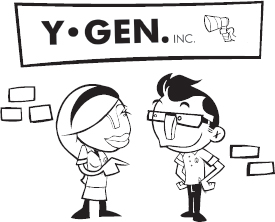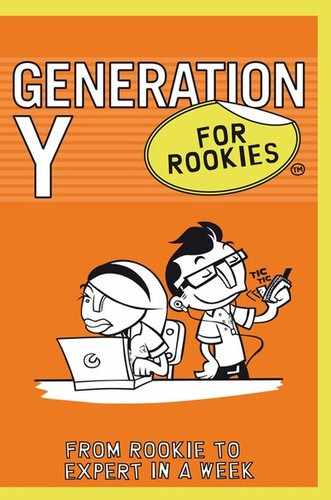CHAPTER 4
Motivating and
engaging Gen Y
Golden Rule No. 1 – don’t assume
The most important piece of advice about Gen Y is not to assume that they are like the other generations. Don’t even assume that they are like one another – there are variations within Gen Y too. It is crucial to find out what engages them. And don’t assume you know what keeps your Gen Y employees motivated – ask them! It’s as simple as that. When you start asking you will definitely be surprised by the answers (often pleasantly so, as they are motivated by some things that are far easier to give than you might imagine).
 Rookie Buster
Rookie Buster
Don’t assume you know what keeps your Gen Y employees motivated – ask them! It’s as simple as that.
What keeps Gen Y engaged at work?
Doing work that they love
In no small part because of the messages they have received from their Boomer parents, Gen Y are conditioned into believing that they should go after work that they really love. In recent years popular psychology has become much more mainstream, and there are hundreds of books encouraging people to “do the work they were born to do” and suchlike. Gen X and Boomers did not grow up in that context. Gen Y did, and good for them that they believe that it is important to do work that you really love. So many older people don’t. (Some of the Boomer mentors I speak to who mentor Gen Y have told me that they find it unbelievable – and unrealistic sometimes – that young people today expect to be able to do work that they love. The Boomers see it as a luxury you achieve if you are lucky.)
The good news is that Gen Y don’t expect employers to somehow miraculously come up with a job for them that they love. They take responsibility for finding the job themselves. But what they do want and expect is help from the older generations to find out what kind of work is right for them and how to make sure that they can mould their job so that they love it. For example, a Gen Y who I was mentoring through his job search found a company that really inspired him. He knew that he would only be able to get an entry level job there on the IT helpdesk, but he also believed that he would make it into something he loved. Indeed he did – his love was solving problems and sharing what he learned with others. All of the jobs that he has had since have fulfilled his needs, because he is clear about what those needs are and he figures out ways of meeting those needs in the roles he takes on. Talk to your Gen Ys about what they love doing and help them to think through how they might use what they love in order to make their job fulfilling.
 Rookie Buster
Rookie Buster
Talk to your Gen Ys about what they love doing and help them to think through how they might use what they love in order to make their job fulfilling.
Working with highly engaged people
This one can be trickier. Imagine a scenario in which the Gen Y is working in a team of disillusioned colleagues. Disaster. We all enjoy working with engaged, enthusiastic people, and it can bring us down if we don’t. Paying attention to this is important, and can mean the difference between a Gen Y staying or leaving. If they are assigned to a team that is not particularly engaged, try sitting them next to a team that is, so at least that rubs off on them.
Making sure they have a good mentor is another way of mitigating the effects of “toxic” co-workers. The mentor can help to keep them boosted and on-track. Similarly, giving them opportunities to stay connected with the other Gen Ys in the organization through social events is important.
Good induction
Good induction starts long before the person’s first day in their job. It starts with your first communication with them. That is when they start to learn about and get a feel for the organization.
So often, organizations miss this opportunity to really engage Gen Ys from the off. Induction programmes are typically one-hit days on which lots of information is downloaded to them, senior managers are paraded in front of them and they are told what they can and cannot do. We would do well to learn from the marketing world when it comes to induction. Sure, it is a chance to impart important information – but it can be done in an engaging and fun way. Gen Ys don’t like to sit in a room for hours being talked at and suffering death by PowerPoint (let’s face it, who does?). They want and expect a two-way interaction. They want to be entertained as well as educated. And they are interested in talking to other people, not just the senior ones – and preferably interesting ones!

 Rookie Buster
Rookie Buster
Gen Ys don’t like to sit in a room for hours being talked at and suffering death by PowerPoint (let’s face it, who does?).
Flexibility and understanding
The rules surrounding working hours, work location and flexible working are being challenged by Gen Y, some of them rightly so. When you think about it, the 9–5 working hours norm was appropriate and fitting for factory workers and other organizations where there was good reason for people to be at their workplace between certain times – for instance, to make efficient use of machinery. Similarly, there were days when people needed to be in the office in order to be able to discuss issues with colleagues, get guidance from their boss and have meetings. Nowadays there are many jobs that can be done from any location as long as there is an internet connection and the right technology available. Of course, no technology can completely replace face-to-face interaction, but providing managers trust their people, there are probably many of them who can work from locations other than their office. If the manager doesn’t trust them, then it raises the question as to whether the company is employing the right people.
Gen Y want to know the rationale if they are told they can’t do something. They won’t obediently say “Oh, OK.” Managing their work outputs rather than how long they are in the office means you can be much more flexible, and you will have a much more motivated workforce. If you think about it, this applies to all generations.
 Rookie Buster
Rookie Buster
Gen Ys want to know the rationale if they are told they can’t do something. They won’t obediently say “Oh, OK.”
Good management/mentoring
Gen Y are used to parents who give them a lot of attention, encouragement and feedback as to how well they are doing. Their parents tend to be very closely involved with their children (hence the term “helicopter parenting”), and certainly much more closely than the X-ers’ and Boomers’ parents were. So when Gen Y arrive in the workplace it’s a shock to them if they get a manager who doesn’t give them much attention, or gives them the wrong kind of attention (such as checking up and criticizing).
 Rookie Buster
Rookie Buster
Invest in a mentoring scheme – it is a great way of making sure you hang on to and make the best of your top talent.
Not many managers like managing or are good at it. That’s just the reality of organizational life. But the effects of an indifferent manager on Gen Y can be mitigated if at least they have an excellent mentor who is interested in them and their progress. Invest in a mentoring scheme – it is a great way of making sure you hang on to and make the best of your top talent. Having a good manager and/or mentor can make up for so many other things that are not right. The old adage is still true – people leave managers, not organizations.
Learning and development
This is hugely important to Gen Y. They want to feel they are constantly learning new things and learning from the other generations. Career succession is for Gen Y less about a “ladder” and more about a journey of discovery and learning. The ladder is linked to promotion and status – Gen Y care less about those things and more about an inner sense of progression. And learning has to be a constant activity. The occasional training course might be important to them, but they want to learn every day. They want feedback, guidance, mentoring and coaching to help them learn. And any formal learning events that they do attend have to be fun, engaging and worthwhile.
Doing meaningful work
Gen Y want to do work that is meaningful to them. The definition of meaningful obviously varies from person to person. When someone says at an interview, “I want to do meaningful work,” interviewers often fall into the trap of not checking out what the person really means by that and simply assume they want to do work that is useful to society in some way. I spoke to a graduate who was working in a bank, and his work was meaningful to him because financial institutions had such a powerful impact on the world. Another Gen Y told me that his work was meaningful to him because he took it upon himself to help new people who joined his team.
A client in a financial services company told me about a costly mistake they had made because of their assumptions about what was important to their graduates. They set up a series of days for the graduates to work in the local community. The scheme completely flopped. When they asked the graduates why, the response they got was that they wanted to do something meaningful, but would prefer to write a cheque rather than do volunteering! Don’t assume that you know what someone means when they say they want to do meaningful work. Ask them the question, “What do you mean by ‘meaningful’?”
 Rookie Buster
Rookie Buster
Don’t assume that you know what someone means when they say they want to do meaningful work.
Playing to their strengths
The best performers are those people who play to their strengths. They are also happier and more energized than they would be if they were not playing to their strengths. Gen Y are probably more aware than the older generations of what their strengths are, because they are likely to have had more feedback. Selecting people for jobs based on their strengths is obviously a good idea – they are more likely to do a good job and less likely to leave, because they will be happy in their work.
Ask people about their strengths when you are hiring them, and also when you are talking to them about their performance. That doesn’t mean ignoring their weaknesses, but leveraging strengths can create exceptional performance, whereas improving weaknesses can only create acceptable performance.
Looking after people once the Graduate
Programme ends
A common complaint from graduates is that they are effectively “dumped” and left to their own devices at the end of their (typically two-year) graduate programme. The end of the programme is one of the most vulnerable times for graduates and their companies, as this is when they leave if they do not feel taken care of. It’s not about pampering or pandering. It’s about providing them with some sense that they are still important to the organization, and that support is available to them. Unless they have a very good manager, an excellent way of providing them with continuity and support is to assign them a mentor. It has to be someone who really wants to do mentoring, is skilled at having top-notch conversations, and has a passion for developing people. Most mentoring programmes are totally ineffective because people have no idea how to be a mentor: they see it as a chore, neither party gets much out of it, and there is no energy or momentum. From what I hear, many mentoring schemes end up that way.
It is not difficult to set up a scheme that works. And the dividends are enormous: managers get to know their top talent really well, it is developmental for both sides, any potential problems that the young person has can be picked up and resolved before they get out of hand, and it can prevent someone from possibly leaving the organization due to lack of support. Good mentoring is an under-used and underestimated technique for developing and engaging people. And it is a superb way of gaining a deep understanding of the talent in your organization. Top tips for setting up a mentoring scheme that works are:
• Choose mentors who really want to do the job and have a natural aptitude for it.
• Train the mentors well – and that means brilliantly well. They need to be able to have high-challenge/high-support conversations. And they need to inspire their mentee.
• Train the mentees too – they need to know how to choose a mentor who is right for them, and how to make the most of the mentoring relationship.
• Let people match themselves with people they want to work with – good mentoring conversations can be challenging for both parties, so they have to like working together.
• Involve the participants in the design of the programme so that they own it.
• Consider a reciprocal mentoring scheme, in which the two people mentor one another. For example, a senior manager may want some help with understanding and using new technologies. The younger person may want help in understanding organizational politics and how to network. They can help each other, and it’s a great way of promoting cross-generational understanding and appreciation in the workplace.
 Rookie Buster
Rookie Buster
Good mentoring is an under-used and underestimated technique for developing and engaging people.
Money
Money is lower down on Gen Y’s list of wants from a job than it typically is for X-ers and Boomers. It is certainly less of a statement of status. They seem prepared to take less money in order to do a job that they really want to do. For example, I have heard of Gen Ys in law firms deciding that they would rather leave and do work they wanted to do, because even the lure of very large salaries further down the line did not make up for the fact they didn’t particularly enjoy the work and really didn’t like the long hours they had to put in. A partner of a law firm in his forties told me he didn’t like the work, the culture or the hours either, but because he earned a lot of money he found it very hard to leave. Gen Ys see their parents and colleagues in this situation and are determined not to get into it themselves.
Having said that, they will not be exploited, and even when they are doing work that they love they expect fair pay for it.
Networking and a chance to work
collaboratively
Working collaboratively is Gen Y’s natural way of working. At school, they work in teams and collaborate on projects and with homework. They like to be able to talk to others – either face-to-face or using technology. They like to be in constant communication. They are used to being able to reach out and ask for help as well as to offer help.
 Rookie Buster
Rookie Buster
Gen Y like to be in constant communication. They are used to being able to reach out and ask for help as well as to offer help.
If you belong to an older generation, you are probably thinking rather enviously, “I would have liked all those things in my job too.” I have found that much of what Gen Y demand, older generations would have quite liked too, but they were conditioned not to expect it. That is the difference. So addressing these issues will result not just in more engaged Gen Y workers, but also in more engaged workers of all generations.
However, there is one clear difference between what Gen X and Boomers want from work and what their Gen Y colleagues want. The older generations are still more focused on the “hygiene” factor elements of work, whereas Gen Y have come straight into the workplace expecting the hygiene factors as a given, and wanting fulfilment and self-actualization too. For example, wanting personal meaning from work is something that typically the older generations haven’t started thinking about until they reach their forties. Again, they were conditioned to want and expect money, status (eventually – and if they were lucky) and security from their work. It was only as the years progressed that they might have started to think about what mattered most to them about the work they did and whether they found it fulfilling enough.
Coach’s notes 
Top tips for engaging your Gen Y
• Don’t assume that you know what is important to them – ask them.
• Gen Y expect different things than their older co-workers do from their company and their managers – don’t assume that what works for one group will work for everyone.
• Gen Y engagement is emotional, not intellectual – you need to engage them personally and individually.
• During recruitment interviews and performance conversations, talk to them about their strengths and what they love to do – having those conversations will in itself be engaging.
• If you do nothing else, set up a strong mentoring scheme – it is one of the most powerful ways of creating high engagement.
• Train managers and mentors to help Gen Ys learn – it is a skill that can be learned and honed. Managers and mentors need to be constantly helping Gen Ys to learn and to realize that they are constantly learning.
Go for it! So much talent is wasted in organizations because people are not fully engaged and not firing on all cylinders. Knowing how to engage Gen Y is knowing how to make the most of this valuable asset.
As you will have learned from this chapter, much of what it takes to motivate and engage Gen Y is very simple, not expensive and very powerful. Imagine if you achieved no more than a 10 per cent increase in motivation from just 10 per cent of your people – what could even that modest achievement do for customer relationships, innovation and productivity? Apply some of the ideas in this chapter and you will get way more than just a 10 per cent increase – now that’s worth having!

Notes |

